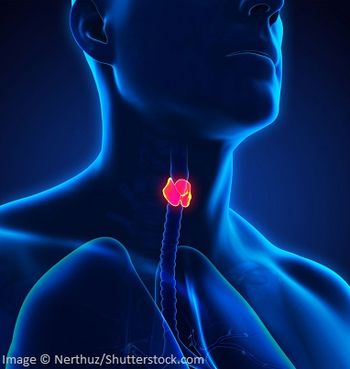
Anlotinib Offers Strong Results in Medullary Thyroid Carcinoma
The multi-target RTK inhibitor anlotinib yielded a high response rate and was well tolerated in patients with advanced medullary thyroid carcinoma.
CHICAGO-The multi-target RTK inhibitor anlotinib yielded a high response rate and was well tolerated in patients with advanced medullary thyroid carcinoma (MTC), according to results of a study (abstract
“MTC is a rare disease with no standard therapies available in China for unresectable, advanced, or relapsed MTC patients,” wrote study authors led by Yongkun Sun, MD, of the Cancer Hospital in the Chinese Academy of Medical Sciences in Beijing. In the United States, several drugs including vandetanib and cabozantinib are approved in this malignancy.
Anlotinib has activity against VEGFR1/2/3, FGFR1/2/3, and other targets. Phase I results previously found a recommended dose of 12 mg daily, in a 2 weeks on, 1 week off schedule. The new study was a phase II study of advanced or relapsed MTC patients who could not undergo radical surgery. It included 58 total patients in China, 34 of whom were male; 55 of those were available for evaluation for efficacy.
The average progression-free survival (PFS) was 12.8 months, and the median PFS was not yet reached. Seven patients achieved a partial response (PR) at the second treatment cycle, and 31 achieved a PR at some time point; the overall objective response rate was 48.28%. At week 24, the disease control rate was 92.16%. At week 48, it had dropped only to 84.53%.
Almost all patients (98.3%) experienced some adverse event. The most common grade 3 or 4 adverse events included hand-foot-skin reactions in five patients (8.62%), hypertension in three patients (5.17%), mucositis in two patients (3.45%), and others that occurred in only one or two patients. Twelve patients required a dose adjustment during the trial, reducing to 10 mg daily instead of 12 mg.
In a poster discussion session, Ann W. Gramza, MD, of Georgetown University, pointed out that in this study there was no requirement for progression based on RECIST criteria prior to enrollment, as in studies of comparable drugs. “They had a good response rate compared to historical controls, with a manageable toxicity profile,” she said. “It will likely become first-line therapy in China, but it is unknown if the drug will be available outside of China.”
Newsletter
Stay up to date on recent advances in the multidisciplinary approach to cancer.



































